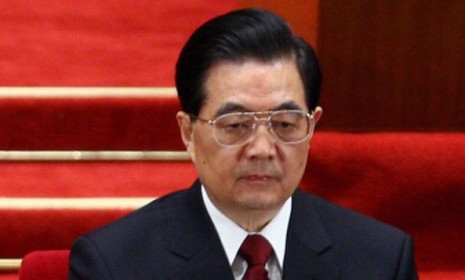Why China isn't (quite) ready to revolt
Chinese leaders fret about a Middle East-style revolt in their country, says Francis Fukayama in The Wall Street Journal. But for now, there's little cause for concern

A free daily email with the biggest news stories of the day – and the best features from TheWeek.com
You are now subscribed
Your newsletter sign-up was successful
In the wake of uprisings in Tunisia, Egypt, and Libya, the Chinese government is scrambling to head off any potential insurrection. State-run media have helped portray the revolts as irresponsible, while censors restrict access to incendiary rhetoric online. But Beijing shouldn't be too worried, says Francis Fukuyama in The Wall Street Journal, because "China will not catch the Middle Eastern contagion anytime soon." For one thing, China is "more clever and ruthless in its approach to repression" than countries like Egypt, which allowed Facebook and Twitter to play a major role in its revolution. China also has a "huge and increasingly autonomous" army that would "not hesitate to fire on demonstrators" in its defense of the state. Perhaps most importantly, China's vast middle class has gotten more affluent in the past three decades, making its lack of democratic voice that much easier to swallow — unless, of course, there's a recession. There are plenty of other reasons, too. Here, an excerpt:
The fact is that authoritarianism in China is of a far higher quality than in the Middle East. Though not formally accountable to its people through elections, the Chinese government keeps careful track of popular discontents and often responds through appeasement rather than repression. Beijing is forthright, for example, in acknowledging the country's growing income disparities and for the past few years has sought to mitigate the problem by shifting new investments to the poor interior of the country. When flagrant cases of corruption or abuse appear, like melamine-tainted baby formula or the shoddy school construction revealed by the Sichuan earthquake, the government holds local officials brutally accountable — sometimes by executing them.
Another notable feature of Chinese government is self-enforced leadership turnover. Arab leaders like Tunisia's Zine al-Abidine Ben Ali, Egypt's Mr. Mubarak and Libya's Col. Moammar Gadhafi never knew when to quit, hanging on 23, 30, and 41 years, respectively. Since Mao, the Chinese leadership has rigidly adhered to terms of about a decade. Mr. Hu, the current president, is scheduled to step down in 2012, when he is likely to be replaced by Vice President Xi Jinping. Leadership turnover means that there is more policy innovation, in sharp contrast to countries like Tunisia and Egypt, which have been stuck for decades in the rut of crony capitalism.
The Week
Escape your echo chamber. Get the facts behind the news, plus analysis from multiple perspectives.

Sign up for The Week's Free Newsletters
From our morning news briefing to a weekly Good News Newsletter, get the best of The Week delivered directly to your inbox.
From our morning news briefing to a weekly Good News Newsletter, get the best of The Week delivered directly to your inbox.
Read the full article at The Wall Street Journal.
A free daily email with the biggest news stories of the day – and the best features from TheWeek.com
-
 What to know before filing your own taxes for the first time
What to know before filing your own taxes for the first timethe explainer Tackle this financial milestone with confidence
-
 The biggest box office flops of the 21st century
The biggest box office flops of the 21st centuryin depth Unnecessary remakes and turgid, expensive CGI-fests highlight this list of these most notorious box-office losers
-
 The 10 most infamous abductions in modern history
The 10 most infamous abductions in modern historyin depth The taking of Savannah Guthrie’s mother, Nancy, is the latest in a long string of high-profile kidnappings